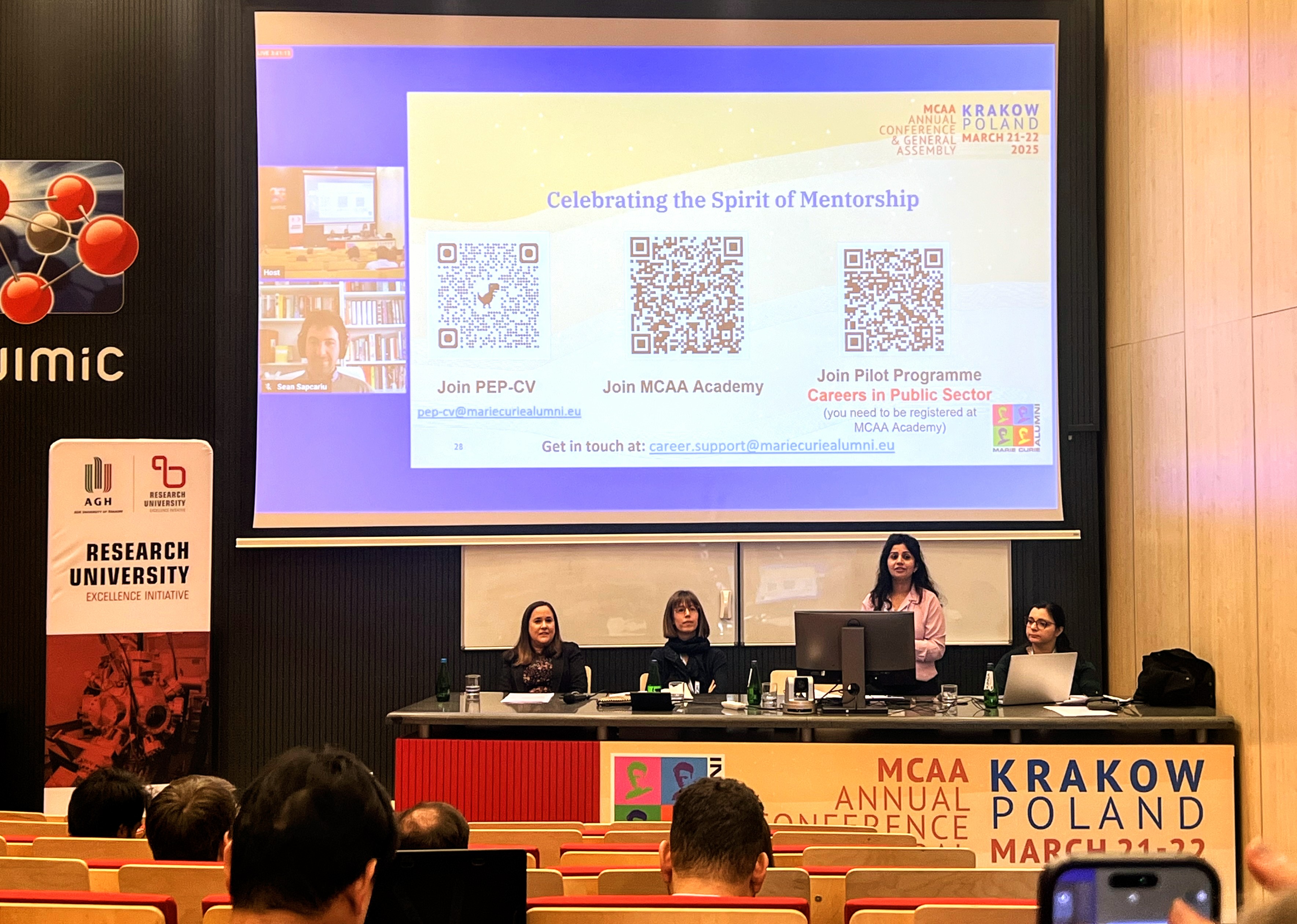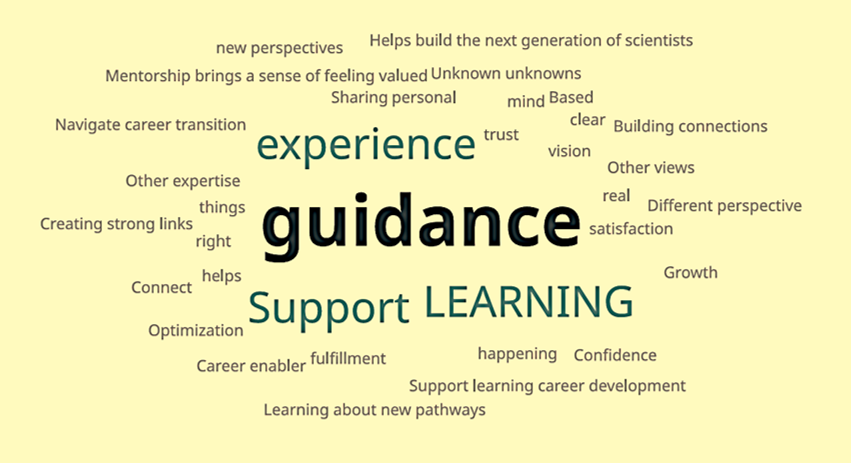MCAA Annual Conference 2025 - Mentoring Festival: Celebrating the Spirit of Mentorship
Newsletter
The MCAA Mentoring Festival 2025 redefined mentorship as a catalyst for transforming research culture. It emphasised that real change begins with valuing people, making mentorship the core of inclusive, thriving research environments.
Mentorship has long been seen as a tool for professional development, but at the Mentoring Festival during the MCAA Annual Conference 2025 in Kraków, it took centre stage as something deeper: a vehicle for reimagining research culture. Organised by the MCAA Community Manager Pooja Khurana and MCAA Board representatives Irene Castellano Pellicena and Maria Romano, the festival brought together diverse voices to reflect on the role mentorship plays in shaping inclusive, supportive and value- driven research environments.
The MCAA has long made mentoring a core value. Launched just last year, the Peer Exchange Platform for Narrative CVs (PEP-CV) has grown to over 800 members and is open to researchers worldwide. Aligned with the DORA (Declaration on Research Assessment) and CoARA (Coalition for Advancing Research Assessment) principles, a key milestone was its collaboration with ORCiD, allowing members to display mentorship experience on their profiles—a small but powerful step toward making mentoring more visible and valued. Meanwhile, the MCAA Academy offers structured, purpose-driven mentoring through its General Mentoring Programme. At the festival, we launched the first pilot, Careers in the Public Sector, supporting alumni exploring paths beyond academia.
Voices that Inspired
A message that echoed throughout the day was the need to manage expectations and build trust, especially in cross-sector mentoring relationships. Xavier Ronald Eekhout Chicharro from EURAXESS Spain’s REBECA mentoring programme reminded us that even after a formal programme ends, mentoring relationships often continue informally, sometimes becoming lifelong connections. He reflected on how mentoring supports science in society by providing pathways for researchers to develop multipotent careers across sectors.
But mentoring can also be radically transformative when it breaks down traditional hierarchies. Stefano Lucca, an MSCA fellow and peer support facilitator, highlighted how peer mentoring fosters openness, co-creation, and mental wellbeing. By shifting away from top-down dynamics, peer models allow both parties to feel heard and respected—especially vital in a field where imposter syndrome and burnout remain common.
Another powerful dimension emerged through discussions around Equity, Diversity, and Inclusion (EDI). Mentoring, when done right, has the potential to challenge the structural inequalities that persist in academia. As Jenny Lind Elmaco, Chair of MCAA’s GEDI (Gender, Equity, Diversity, and Inclusion) Working Group, put it, we need to design spaces where everyone feels safe to speak, belong and succeed, not despite their identity, but because of it.
Mentorship: Recognition, Culture & What We Value
Mentorship, like research, is relational. But who gets to decide what counts as success? And how do we make sure those offering guidance and support, often invisibly, feel valued? Who defines it, and who gets to be seen and valued within those definitions?
As Sean Sapcariu, PEP-CV supporter and Project Manager at FNR (Luxembourg National Research Fund), reflected, mentors have the power to shift what and who is valued in research. When mentorship moves beyond credentials and into care, it transforms culture. Yet, mentorship is not without its challenges. As shared candidly by Irene, negative experiences with mentors can leave a mark. But learning from bad mentorship can still guide us to become better mentors for others. Because in the end, mentorship isn’t about perfection or hierarchy—it’s about showing up, being human and choosing to grow together.
When we prioritise people over prestige and lived experiences over linear paths, we lay the foundation for a more inclusive and empathetic research culture. But how do we recognise and reward those who make time to mentor others? Too often, this labour goes unseen. Karen Stroobants, Vice Chair of CoARA, stressed that reforming researcher assessment shouldn’t mean adding more metrics but valuing what people are already doing. As echoed by our audience, whether through narrative CVs, ORCID visibility or digital badges, small shifts in recognising mentorship can begin to shift the culture.

Sean Sapcariu, Irene Castellano Pellicena, Karen Stroobants, Pooja Khurana and Maria Romano. On the screen, one can see the MCAA Mentoring Initiatives: PEP- CV and MCAA Academy.

Slido response to: Why is Mentoring Essential?
A Shared Responsibility to Reform
The festival closed with a lively speed- networking session, where participants reflected on challenges like discussing career breaks, navigating uncertainty, and maintaining balance. One takeaway stood out: We make time for what we value. If we want research cultures that are kind, inclusive, and equitable, mentorship must be more than an optional extra—it must be woven into how we work, evaluate, and connect. Mentorship is more than a programme - it is a commitment to people. It’s about recognising potential, building trust and co-creating a system where growth, inclusion and kindness are at the core.
The Mentoring Festival showed that true change begins with valuing people, not just results. Let’s build a research culture where mentorship isn’t optional—it’s the core, and everyone has a place.
Pooja Khurana
X
LinkedIn
Orcid
Community Manager and ECS Project Officer, MCAA
pooja.khurana@mariecuriealumni.eu
References
MCAA. (2024). Peer Exchange Platform for Narrative CVs (PEP-CV). https://pep-cv.mariecuriealumni.eu/
Declaration on Research Assessment. (2012). San Francisco Declaration on Research Assessment (DORA). https://sfdora.org/read/
Coalition for Advancing Research Assessment. (2022). Agreement on Reforming Research Assessment. https://coara.eu/agreement/the-agreement-full-text/
MCAA Academy Pilot Programme. (2025). Careers in the Public Sector. https://www.academy. mariecuriealumni.eu/app/space/careers-in-public-the-sector/view-programme/about (You have to be registered to the MCAA Academy to log in)
MCAA. (2014). Gender, Equity, Diversity, and Inclusive (GEDI) Working Group. https://www. mariecuriealumni.eu/groups/genders-equity-diversity-inclusion-gedi